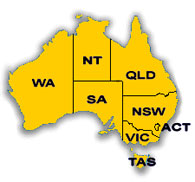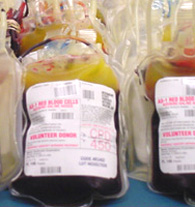Australian territory to allow gay civil marriages
The Australian Capital Territory (ACT) is set to become the first territory or state in Australia to offer gay couples the same rights as married heterosexual couples after years of lobbying from the homosexual community.

"It's an advance on a... registration scheme," Stanhope said. "The civil union scheme or the Civil Union Act which we propose to pass in the ACT will essentially create domestic relationships."
He said the ACT had conducted an extensive public consultation process with the Government preparing a discussions paper canvassing three models.
One of which was to do nothing and maintain the currently position, accepting that discrimination against gays and lesbians was acceptable. Another was to follow in Tasmania's footsteps and register same-sex couples without the full suite of legal recognitions that the ACT laws propose.
"Then, there's the prospect of a civil union arrangement which does create a functional equality. It is quite significant as a matter of law," Stanhope said.
He said the civil union as proposed for ACT law would not impact on the definition of marriage within the Commonwealth Marriage Act which applies throughout the country.
"There's very little to distinguish civil union from the legal impacts or affects of marriage. But a civil union is not a marriage."
Gay couples in the capital Canberra could be holding ceremonies - as early as the middle of the year - to have their relationships formally recognised as early as the middle of the year.
Stanhope's Labour Party has a majority in the one house ACT parliament and expects to pass the legislation in May.
New Zealand passed similar laws in 2004 and the United Kingdom introduced civil unions in December last year. Spain, Belgium, the Netherlands, Denmark, Germany and France all allow for formal recognition of same-sex relationships.
International health group warns Asia-Pacific nations in light of rising HIV rates among Asia's MSM population
Monitoring the AIDS Pandemic (MAP), a United Nations funded surveillance network of internationally recognised technical experts, has called for to Asia-Pacific nations to take note and respond to the increasing HIV rates among men who have sex with men or MSM in Asia.

Similar trends were reported elsewhere in Asia, where 2005 surveys from MAP found 18.8 percent of MSM were HIV-positive in Mumbai, India and 12.8 percent of MSM were HIV-positive in Phnom Penh, Cambodia.
"This new data is an alert to Asia-Pacific nations to take serious these issues among MSM," said Jeanine Bardon, regional director of US-based Family Health International, a non-profit public health organisations, managing research and field activities in more than 70 countries.
"This suggest the epidemic has been there for sometime. You don't get 28 percent over night. It's a big alert for people to respond."
Bardon among other researchers have warned that while some countries are reluctant to acknowledge that men have sex with men, some are hostile to gays - including many countries which ban homosexual activities.
Prasada Rao, regional director for UNAIDS was quoted as saying that countries such as Pakistan, the Philippines and Indonesia are unwilling to recognise homosexuals as a vulnerable group.
In countries where homosexual acts are punishable by jail terms, AIDS educators report that MSM miss out on safe sex messages and are unlikely to be distributed condoms; and are harder to reach because they fear being exposed and discriminated against.
Countries such as Fiji, India, Malaysia and Singapore - all of whom inherited Victorian-era British laws against homosexual conduct - outlaw homosexuality and if convicted, face jail terms. Gay sex is illegal in Fiji and carries a jail sentence of up to 14 years and flogging. As recently as 2004, an Australian university lecturer and a Fijian man were sentenced to two years in jail for homosexual acts. In Malaysia, hardline Muslim groups have demanded authorities pass harsher penalties against homosexuality.
Gays in Thailand, which enjoys a greater degree of openness compared to its neighbours, are targets of a new campaign launch in February which warns about the risks of unsafe sex and encourages condom use. The effort will also will include voluntary counseling, treatment and condom distribution in parks, discos and other venues where gays gather.
Portugal lifts ban on gay blood donors
It remains to be seen if the US Food and Drug Administration (FDA) will reverse a 16-year-old ban on gay blood - originally enacted due to the inability to test the supply for HIV - following the recommendation of the American Red Cross earlier this month.

"The current trend is toward equality of criteria for all regardless of their sexual orientation," Jose de Almeida Goncalves, head of the National Blood Institute, was quoted as saying in an Agence France-Presse report.
Goncalves said that the reasons behind dropping the ban on gay donors was due both to better blood-screening methods and the fact that heterosexuals in the country are now at a higher risk of contracting HIV than gay men.
Canada announced earlier this month that it is keeping its ban on gay blood donors in place, while the US FDA announced that its blood safety committee will discuss dropping the US ban on gay blood donors - a decision that would take three to six months. Currently, FDA rules state that any man who has had sex even one time with another man since 1977 is barred for life from donating blood. With support from the Red Cross, the ban was reaffirmed in 2000 and its current recommendation requires that gay men abstain from sex for at least a year.
